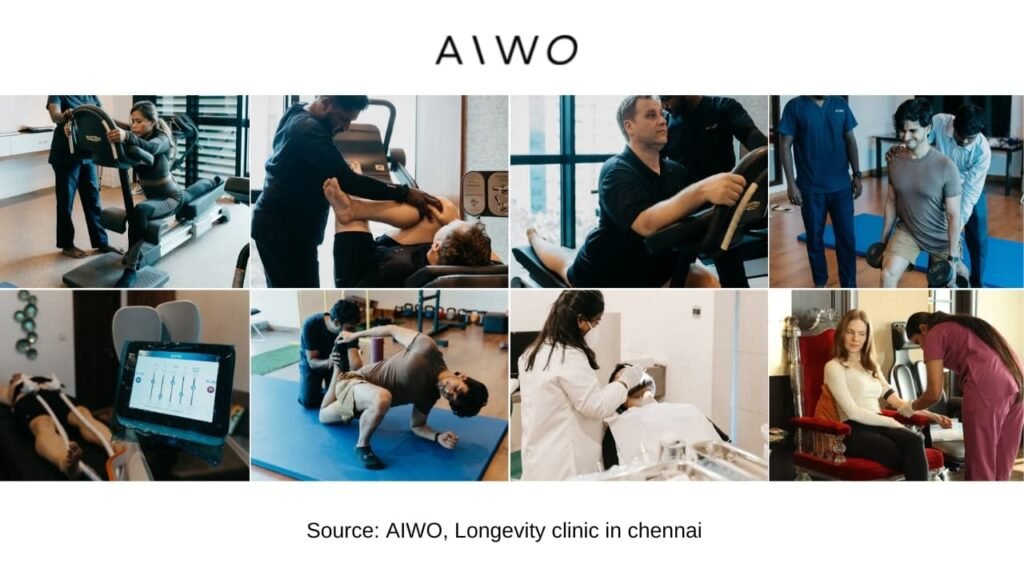
Table of Contents
Would you believe me if I said you could live up to 150 years?
Okay, 150 years might sound a bit too much, but what about 120 years?
Still, unbelievable?
This might sound like a fantasy right now, but with advances in longevity tech, living up to 120 years can soon become a possibility. Also, it’s not just about extending your lifespan. It’s about improving your health so that you can stay young for a longer period.
After all, none of us want to live in a wheelchair. Do we?
Understanding Longevity
Before we dive into details, let’s first figure out what the hell is Longevity.
By definition, longevity simply means living a longer life. It’s about finding ways to increase life expectancy.
There are four domains to longevity, all of which contribute to improving quality of life during longer healthspans:
1. Prevention: prevent damage that causes ageing;
2. Diagnostics: early identification of ageing damage;
3. Treatment: treatment of damage that has occurred;
4. Renewal: reversal of damage that has occurred.
With advancements in the science of longevity and technology, researchers strongly believe we can soon push this limit to 120 years. This revelation has sparked a global interest in decoding ageing and unlocking the secrets to a longer, healthier life.
Key Longevity Technologies
Longevity science today is dominated by three names. Genetic editing, nanotechnology, and AI. The following technologies hold the potential to transform the whole approach to ageing and health. Read on!
Genetic Editing
Gene-modifying technologies like CRISPR hold much promise in giving scientists the ability to alter DNA, potentially eradicating diseases and slowing the ageing process. For instance, studies have shown promising results in editing genes associated with age-related diseases like Alzheimer’s. Researchers at the University of California San Diego have already managed to extend the life span of yeast cells by 82 per cent, by altering the genetic circuit controlling the aging process. With such advancements, the phrase ‘May You Live Long’ could become a reality.
Nanotechnology
Matter at the atomic level can be manipulated to replace or repair worn-out cells and tissues, thereby leading to longevity. Researchers are developing nanoparticles that can deliver drugs directly to the damaged cells that conventional medication fails to reach. In this way, age-related cell damage can be reduced. Nanobots, microscopic machines deliverable by syringes, can be controlled remotely to perform pre-programmed surgical tasks.
AI in Drug Discovery
Conventionally, more than $1 billion and at least 10 years are required to develop a novel therapy and secure government approval. AI can accelerate this process and improve the success rate of early drug development.
AI-Assisted Reproductive Technologies
AI could work on remedies to improve success rates and assess embryo quality during IVF treatments. It will help in making personalized strategies for the embryo selection process.
Bioprinting
This technology can help overcome organ transplant supply shortages by printing living cells that imitate living tissue. Clinics may be able to create skin and bone grafts, implants, and even organs with 3-D printers.
Brain-Computer Interfaces (BCIs)
BCIs capture the human brain’s electromagnetic signals and translate them into commands for an AI interface. This technology offers a chance for improved mobility for individuals with disabilities and may help relieve paralysis, treat serious brain diseases, and enhance cognition.
Cell Reprogramming
Regenerative medicine and specialized cell therapies using adaptable stem cells are among the front-runners in halting or reversing the ageing process.
Obesity Drugs
GLP-1 medicines, initially used to treat type 2 diabetes, are now showing they can address obesity and potentially its associated diseases.
Psychedelics
Emerging therapies using psychedelics are gaining popularity in treating mental health conditions like depression, showing significant improvements in treatment outcomes.
Smart Chemo
Replacing traditional chemotherapy with targeted antibody-drug conjugate (ADC) drugs promises a long-overdue upgrade to how cancer is treated, potentially creating a significant market for these advanced therapies.
These innovations are not just theoretical but are actively being researched and implemented, showing a strong possibility of extending the human lifespan.
Simple Steps to Longevity
Living longer and healthier means we spend only some of our time in the doctor’s clinic. Simple changes in our daily routines can make a significant difference. Here are some practical steps that anyone can take to ensure longevity:
Wearable Tech

Wearable tech has changed how we monitor our health. Devices like smartwatches and fitness trackers give us real-time data on our vital signs, activity levels, and sleep patterns.
For instance, Fitbit and Apple Watch can monitor heart rates, track steps, and even detect irregular heart rhythms, which can help users detect health issues early and sometimes even save their lives.
A 36-year-old man from Flitwick in Bedfordshire, UK, has credited his Apple Watch for alerting him to an undiagnosed heart condition. According to the BBC, Adam Croft woke up to find that his watch had been alerting him throughout the night that his heart was in Atrial fibrillation, or AFib, which means his heartbeat was not regular. When he visited the hospital for a check-up, he was informed by the doctors that his Apple Watch was right.
Mobile Apps Promoting Sleep, Diet, Overall Health
Today, with health apps ranging from our sleep trackers and diet planners to our fitness guides, it becomes quite easy to seek a healthy life. There are MyFitnessPal or Sleep Cycle, which provide recommendations on a personal level, as well as reminding us of how their targeted health goals could be achieved. Integrating the longevity diet into these apps can further enhance their effectiveness.
To validate this, a study published in the Journal of Medical Internet Research found that mobile health apps significantly improve users’ diet and physical activity, leading to better health.
Role of Social Media Influencers
Social media influencers play a significant role in promoting healthy lifestyles. Influencers specializing in the fields of fitness, diet, and meditation offer tips that can be helpful, along with providing quick motivation. For example, social media influencers like Joe Wicks and Adriene Mishler inspire millions towards living a healthy life by posting engaging content. Their promotion of walking and longevity underscores the simplicity and effectiveness of regular physical activity.
Furthermore, a survey conducted by the International Journal of Environmental Research and Public Health highlighted that social media influencers influence the health conduct and behaviours of their followers when it comes to exercise and diet.
Longevity Centres

Longevity health services are becoming popular around the globe. These are special centres conducting comprehensive health checkups and even offering a custom-made longevity plan. This is way beyond traditional healthcare. This is not a hospital, where you visit when you have a health problem. This is where you go when you want to live longer. Too early to tell the effectiveness of these centers, but the idea sounds exciting.
One such example is AIWO. It is a longevity clinic in Chennai, India. It is conducting advanced diagnostic screenings that offer custom-made health plans that help lengthen life. Recently we saw many popular Indian YouTubers visit this longevity clinic.
Such tests range from physical to cognitive and then cellular parameters. After these, the clients are provided with highly detailed reports suggesting lifestyle changes and personalized treatment plans. With such personalized longevity plans, the probability of a patient’s health and vitality improvement is significant.
Modern Ease of Living Healthier
It’s way easier to live a healthier, longer life today, compared to our ancestors. Medical science, along with better access to nutritious food and living conditions, has increased the human life span significantly.
In the last 100 years, global life expectancy has more than doubled.
According to the World Health Organization, global life expectancy increased from 31 in 1900 to 72 in 2019. The steep increase in longevity shows how humans have continued to evolve over the century and we are continuing to improve health care, sanitation, and nutrition. And I strongly believe that we are just getting started!
Scriptural Insights
Throughout history, various scriptures from different religions have mentioned long life. These scriptures on long life offer not just spiritual guidance but also practical wisdom.
Here are a few popular mentions:
- The Bible: “Honor your father and your mother, so that you may live long in the land the Lord your God is giving you.” (Exodus 20:12).
- The Bhagavad Gita: “He who has no attachments can love others, for his love is pure and divine. One who understands this nature of life does not grieve and is always content.” (Bhagavad Gita 2:57).
- The Tao Te Ching: “The secret of long life is to live without desire.” (Tao Te Ching 7).
- The Ayurveda: “He who has a regulated diet, regulated work, regulated sleep, and regulated life will live long.” (Charaka Samhita 1.6).
In India, many sadhus and yogis are known to live well beyond 100 years through the practice of yoga and meditation. These practices focus on maintaining physical, mental, and spiritual health, contributing to their long life span.
In this social media age, this ancient wisdom is regaining popularity, making people aware that the science of longevity isn’t just about new technologies. It is also about the timeless wisdom of our ancestors.
Conclusion
As we embrace the era of technological advancements, the idea of a longer lifespan is slowly becoming more interesting and possible. With amazing breakthroughs in genetic editing, nanotechnology, and artificial intelligence, the future suggests that we will live not just longer, but healthier and more productive lives. However, as we push the boundaries of longevity tech, we must also consider the longevity risk associated with these advancements to ensure a balanced approach.
Thanks to wearable tech, health apps and social media influencers, it has never been easier to chin up and manage our health. And by incorporating these small changes in our daily lives, there is no reason why any of us wouldn’t live a long life. This dream of living to 120 is not just a fantasy anymore. How Longevity Tech Could Extend Your Life is not just a question but a possibility that is growing stronger with each passing day.
To keep getting clarity on such interesting topics, please subscribe to Clarity Circuit.
Recommended Articles
If you found this topic interesting, you might also enjoy reading these articles:


